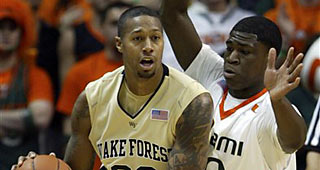A few weeks ago when it looked like a good probability that James Johnson would be traded by the deadline, I discovered that I couldn't find an adequate photograph of him in a Bulls' uniform from our AP archive. This sums up how unimpressive and minimal the season and a half NBA career of Johnson has been.
For Johnson's sake, seeing him back in a Wake Forest uniform at least gives everyone an opportunity to remember the promise he showed before the 2009 NBA Draft. Johnson became the 16th overall pick, ahead of a very impressive run of guards that I'll get to shortly.
Dating back to 2009, this was my general assessment of Johnson:
James Johnson has some very good skills for a player his size, but he is a classic case of a guy that should be a bruising power forward who is mistakenly in love with his finesse game..
..He is a good rebounder and he likes to trigger early offense himself by taking the ball up the floor. He gets physical when battling down low and on the offensive glass he frequently gets to the rim for putbacks largely due to how difficult he is to box out since he comes storming in from the perimeter.
With Johnson you’re getting a talented package, but you’re also getting a player that needs to add maturity to his game and his character.
Bryan Colangelo is sticking to the script with this trade, taking a low risk gamble on a once promising player that is still young, hasn't been given a fair chance on the floor and plays a position of relative need.
We saw Danny Ainge accumulate as many players like Johnson as possible in the build-up to the Kevin Garnett trade and we know how that worked out for Boston. Cap space or loading up on undervalued assets (plus lottery luck both ways) is the only way to rebuild and this is at least what Colangelo has done since it was clear Chris Bosh was leaving.
This draft class should be weak (perhaps historically weak depending on how many underclassmen declare amid labor uncertainty) and Miami will almost certainly be selecting between 25 and 30, which is the part of the draft where role players are found. Toronto has plenty of role players and though Johnson's ceiling appears to be 'role player', he has more latent talent than what I'm projecting to be available in the late 20s.
Johnson has only played 123 NBA minutes this season and another 257 in eight D-League games. He averaged 19.3 points and 8.9 rebounds in the D-League, shooting a good percentage from the field (53.5%) and from the line (91.8%).
Johnson can play the game impressively for stretches, but whether he can ever play it consistently at the NBA level where lapses of judgment are almost always exploited is the primary question Toronto is now on the hook for to discover.
Grade for Raptors: B
For Chicago, picking up Miami's draft pick holds value as an asset in three ways:
1. The Bulls' franchise remains inherently thrifty and the pick can be sold for $3 million this June. This matters to the Reinsdorfs more than anyone else but if it means paying a little more on the luxury tax down the road, we can justify it that way (if it even happens in the first place).
2. From a basketball perspective, players picked late in the first round have tremendous value in relation to the rookie scale. Taj Gibson is making approximately $1.118M this season as the 26th overall pick in 2009, while Johnson is making $1.714M. In lean draft years where draft board opinions differ to a high degree, a team should be able to still acquire a player they have 16th on their draft board at 26th and save that extra $2 million over the life of the rookie contract.
3. The first round pick can also be flipped in a trade for a player that would improve the team's playoff chances this season. Johnson is turned into this blank slate asset.
The excellent Gibson pick compensates for the Bulls wasting the 16th on Johnson, but it is difficult not to possess regret over passing on Jrue Holiday, Ty Lawson, Eric Maynor, Darren Collison, Omri Casspi and Rodrigue Beaubois. Those guards are overqualified to be Derrick Rose's backup, but they could coexist on certain nights and all of them would yield considerably more than Miami's first round pick.
Johnson was never going to fit into Chicago's plans because they don't have the minutes or patience to allow him to figure out his mistakes.
The Bulls abandoned a sunk cost with this trade, while picking up the pick and also creating cap space for a separate deadline trade.
Grade for Bulls: A



